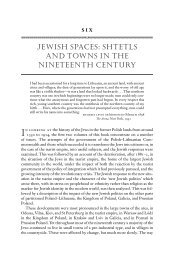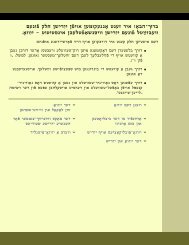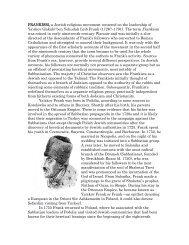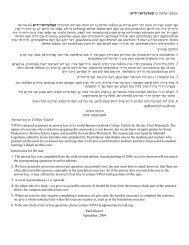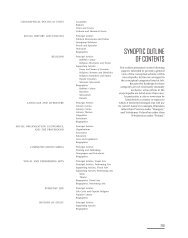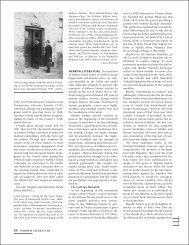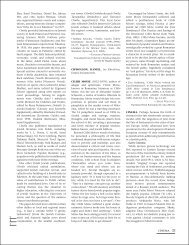t any plant names in Yiddish - YIVO Institute for Jewish Research
t any plant names in Yiddish - YIVO Institute for Jewish Research
t any plant names in Yiddish - YIVO Institute for Jewish Research
Create successful ePaper yourself
Turn your PDF publications into a flip-book with our unique Google optimized e-Paper software.
XXXXII<br />
˘È„”È Ôȇ ËÏÚÂÂ≠ÔÒ˜ÈÂÂÚ‚ È„ Ÿ ¯ÚËÎÚ˘ È΄¯Ó<br />
synonym or variant <strong>in</strong> the spoken language, belles-lettres, poetry, and memoirs,<br />
but a preference <strong>for</strong> the term referred to <strong>for</strong> scientific usage.<br />
More detailed <strong>in</strong><strong>for</strong>mation about the symbols and abbreviations used<br />
<strong>in</strong> the section "Plant <strong>names</strong> and their sources" are available <strong>in</strong> the <strong>Yiddish</strong><br />
version of this chapter.<br />
Treatment of gender, number, orthography, and pronunciation <strong>in</strong> the<br />
section "Plant <strong>names</strong> and their sources" are dealt with <strong>in</strong> the <strong>Yiddish</strong> chapter<br />
"Shprakhike onvayzn" of the Introductory section.<br />
Troubleshoot<strong>in</strong>g<br />
Follow<strong>in</strong>g are several possible scenarios which may face the user of<br />
PNY. They will be succ<strong>in</strong>ctly <strong>in</strong>structive of how to f<strong>in</strong>d one's way about this<br />
work.<br />
1. A user knows the <strong>in</strong>ternational/Lat<strong>in</strong> scientific name of a <strong>plant</strong> and<br />
wishes to f<strong>in</strong>d its <strong>Yiddish</strong> equivalent. S/he will f<strong>in</strong>d this <strong>in</strong> the tril<strong>in</strong>gual<br />
dictionary.<br />
2. The <strong>Yiddish</strong> name of a <strong>plant</strong> or fruit is known to the user, but s/he<br />
wishes to f<strong>in</strong>d out the Lat<strong>in</strong> name. S/he will f<strong>in</strong>d the term and relevant<br />
<strong>in</strong><strong>for</strong>mation about the term (gender, plural <strong>for</strong>m, sources, normative<br />
comments, etc.) follow<strong>in</strong>g the term <strong>in</strong> the section "Plant<br />
<strong>names</strong> and their sources." If this happens to be the term recommended<br />
<strong>in</strong> PNY as the standard, the Lat<strong>in</strong> name will be listed under<br />
that entry. If it is not, the standardized <strong>Yiddish</strong> term will be <strong>in</strong>dicated<br />
by ÔÚÊ ('see') or =. The user will then look up that term <strong>in</strong> the<br />
section "Plant <strong>names</strong> and their sources" and f<strong>in</strong>d the official Lat<strong>in</strong><br />
name.<br />
3. The user knows the <strong>Yiddish</strong> name of a <strong>plant</strong> or fruit and wishes to<br />
found out the English name. S/he uses the section "Plant <strong>names</strong><br />
and their sources" as <strong>in</strong> case (2) to f<strong>in</strong>d the Lat<strong>in</strong> name, then looks<br />
up the Lat<strong>in</strong> name <strong>in</strong> the tril<strong>in</strong>gual dictionary, next to which will be<br />
listed the English name.<br />
4. The user knows an English term and wishes to f<strong>in</strong>d the <strong>Yiddish</strong><br />
equivalent. S/he must look up the English term <strong>in</strong> the "English Index"<br />
and f<strong>in</strong>d there the page number at which to look <strong>for</strong> the answer<br />
to his question <strong>in</strong> the tril<strong>in</strong>gual dictionary.<br />
5. If the user knows the Hebrew (or Czech, French, German, Hungarian,<br />
Polish, Rumanian, Russian, Spanish, etc.) name and seeks<br />
the <strong>Yiddish</strong> equivalent, s/he must look up the Lat<strong>in</strong> name of the<br />
<strong>plant</strong> <strong>in</strong> a comprehensive reference work of the respective language<br />
and then look the <strong>Yiddish</strong> name up <strong>in</strong> our tril<strong>in</strong>gual Lat<strong>in</strong>-<br />
English-<strong>Yiddish</strong> dictionary. In the case of Hebrew, we recommend<br />
look<strong>in</strong>g it up <strong>in</strong> Magdir letsimkhey erets yisrael. If the Lat<strong>in</strong> name is<br />
impossible to f<strong>in</strong>d, s/he has to try to f<strong>in</strong>d the English name of the



